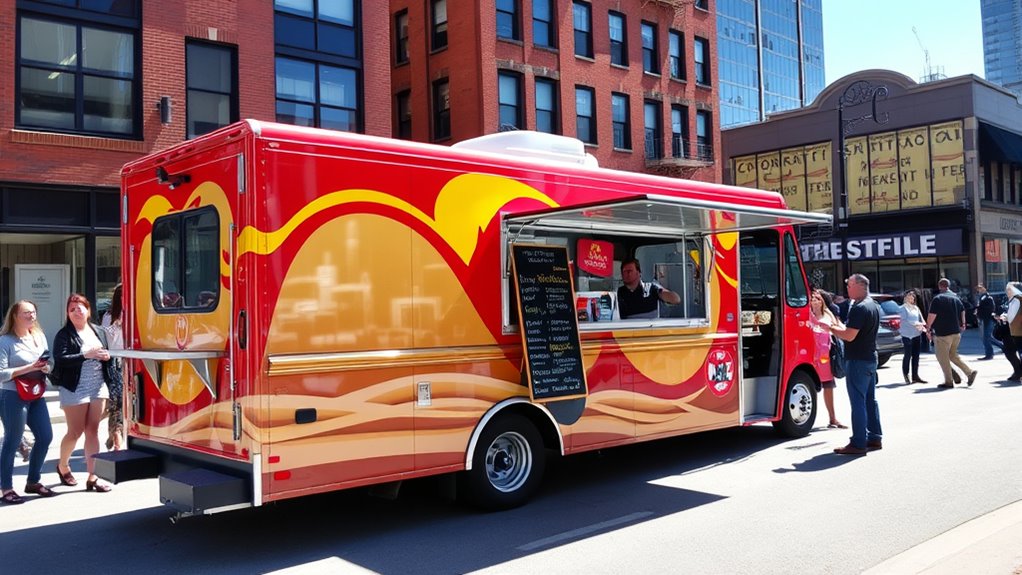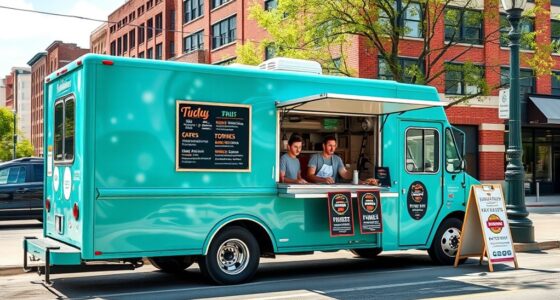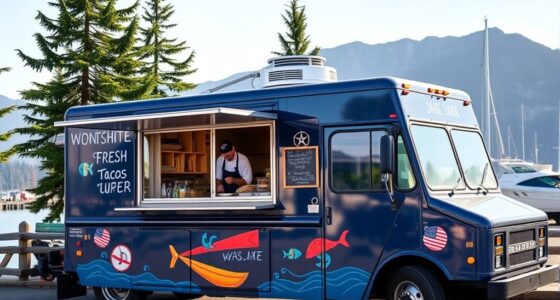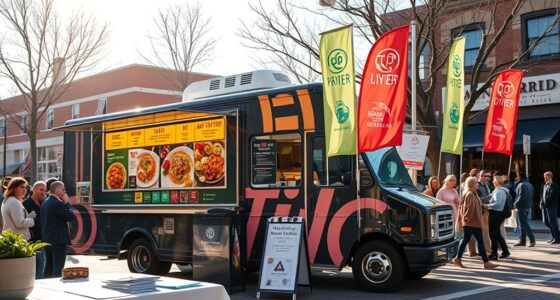To launch a food truck in Buffalo, you’ll need permits like the MFV license from the Office of Licenses, health permits, and proof of registration. Budget around $100,000 to $250,000 for startup and ongoing costs, and choose locations carefully to avoid restricted zones. Develop a safe menu that complies with health standards and craft marketing strategies using social media and local events. Keep exploring to discover detailed steps for each stage of your food truck journey.
Key Takeaways
- Obtain necessary permits including MFV license, Erie County Health Permit, and proof of vehicle registration, along with criminal background checks.
- Budget between $100,000 and $250,000 for startup costs, including trucks, equipment, and licensing fees.
- Operate on streets or public property, ensuring compliance with distance and zoning restrictions; avoid the downtown district.
- Develop a safe menu focusing on proper food handling, allergen labeling, and NYS health standards to ensure safety and compliance.
- Promote your food truck via social media, participate in local events, and build partnerships to increase visibility and customer loyalty.
Navigating Permits and Licensing Requirements in Buffalo

Handling permits and licensing requirements in Buffalo can seem complex, but understanding the key steps makes the process straightforward. First, you need a Mobile Food Vehicle (MFV) license from the City of Buffalo’s Office of Licenses, which requires Common Council approval. You must also obtain an Erie County Health Permit to meet sanitation standards. All operators need to provide proof of motor vehicle registration and valid NYS driver’s licenses. A criminal background check is mandatory for each applicant and corporate officer. Insurance coverage of at least $1 million per occurrence is necessary, covering liability, property, and workers’ compensation if you have employees. Submit a thorough application, including a truck photo, insurance, registration, background checks, and health permit, at Buffalo City Hall’s Office of Licenses.
Estimating Costs and Managing Fees for Your Food Truck Venture

Estimating the costs and managing fees for your food truck in Buffalo requires careful planning to guarantee your venture remains financially sustainable. You should budget between $100,000 and $250,000 for startup costs, including the truck, equipment, permits, and initial inventory. Custom trucks cost $75,000 to $150,000, while used trucks are typically $40,000 to $80,000. Monthly operating expenses generally range from $5,000 to $10,000, covering food, fuel, labor, insurance, and parking. Permit and licensing fees for the first year average $20,000 to $30,000, with renewal costs ongoing. To assure expenses, consider streamlining your menu, utilizing digital ordering platforms, and budgeting for unexpected repairs or fees like marketing and parking. Proper financial management ensures your food truck stays profitable in Buffalo’s competitive market. Additionally, understanding permits and fees specific to Buffalo can help you navigate local regulations more effectively.
Finding Suitable Locations and Understanding Zoning Restrictions

Finding suitable locations for your food truck in Buffalo requires a clear understanding of local zoning restrictions and permit requirements. You can operate on streets and public property, but operating on private property needs a Stationary Peddler’s License. Avoid the Special Downtown District, as trucks aren’t permitted there, and stay at least 100 feet from open licensed food establishments to prevent competition. Also, keep your distance from sanctioned events—500 feet or more—to comply with regulations. Check with local municipality offices for parking and traffic laws affecting mobile vendors. To secure a spot, apply through Buffalo’s Office of Licenses, providing proof of health permits, insurance, and compliance with sanitary codes. Use a measuring wheel to verify distance restrictions and ensure your chosen location is compliant. Additionally, understanding the effectiveness of eye patches can be useful if you plan to promote your food truck as a healthy, self-care-focused brand.
Developing a Safe and Compliant Menu for Local Regulations
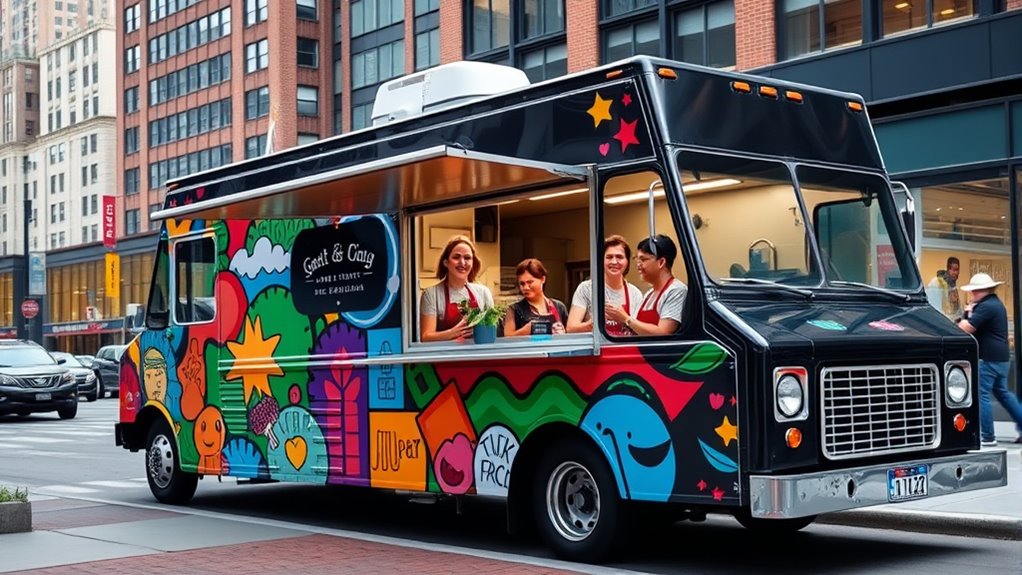
Developing a safe and compliant menu for your Buffalo food truck starts with understanding the local health and safety regulations that govern food preparation and service. To ensure conformity, focus on these key points:
- Select menu items that can be prepared and held at safe temperatures with your truck’s equipment.
- Clearly declare potential allergens on your menu or signage, following health department recommendations.
- Minimize perishable ingredients and source from approved suppliers to maintain proper cold chain management.
- Adhere to the NYS Sanitary Code standards and ensure all food handling practices meet the requirements set by local health authorities.
Additionally, ensure your menu aligns with Buffalo’s licensing requirements, including the Erie County Health Permit and NYS Sanitary Code standards. Proper labeling, safe storage, and hygiene practices are essential to keep your operations compliant and your customers safe.
Effective Marketing Strategies to Grow Your Food Truck Business
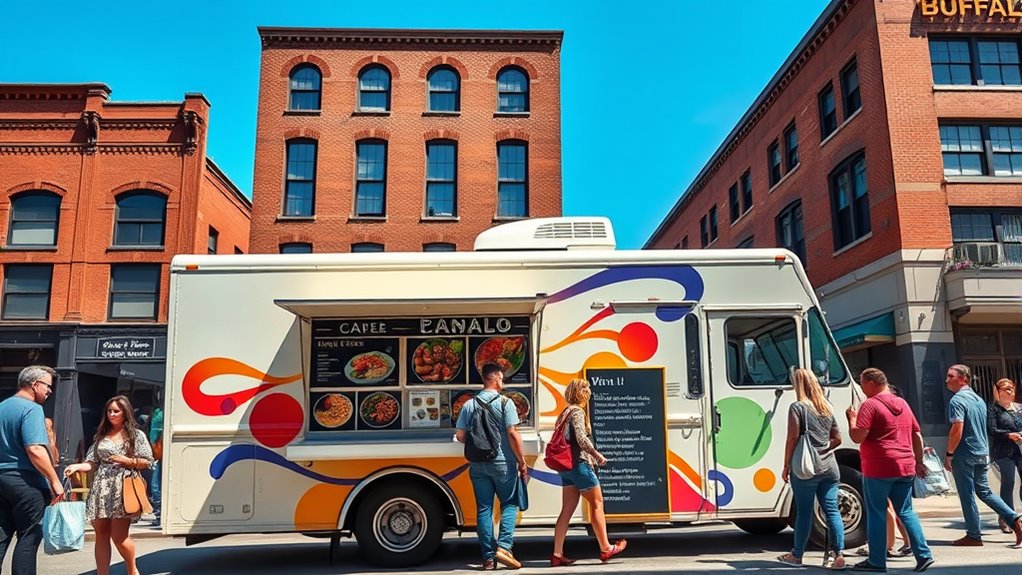
To successfully grow your Buffalo food truck business, implementing effective marketing strategies is essential. Leveraging social media platforms like Facebook, Instagram, TikTok, and Snapchat allows you to engage customers and promote your locations. Regular posting boosts visibility and can increase sales by around 20%. Participating in festivals and local events helps build your brand, attract foot traffic, and foster community connections. Developing customer loyalty programs, such as digital punch cards and email marketing, encourages repeat visits and deepens customer relationships. Using GPS and mobile apps makes it easier for customers to find you, reducing wait times and enhancing convenience. Over 50% have implemented loyalty programs, resulting in a 30% increase in repeat visits. Additionally, understanding and applying decluttering techniques can help you organize your food truck operations more efficiently, leading to a smoother customer experience. Finally, forming local partnerships with businesses, breweries, and influencers broadens your reach and elevates your presence within Buffalo’s vibrant food scene.
Frequently Asked Questions
How Long Does the Permit Approval Process Typically Take in Buffalo?
You’re probably wondering how long the permit approval takes. In Buffalo, the process usually spans 5 to 10 business days for initial review, but delays can happen if your application is incomplete or needs extra health inspections. After passing inspections, final approval and permit issuance take about 3 to 5 business days, plus possible delays during peak seasons. Planning 6-8 weeks ahead helps guarantee you’re ready to operate on time.
Are There Any Specific Vehicle Modifications Required for Inspections?
You need to guarantee your food truck has specific modifications for inspection. These include proper ventilation, sinks, and cleanable surfaces that meet NYS standards. You must also have a detailed floor plan showing food prep areas, waste disposal, and equipment placement. Additionally, your vehicle needs barriers to prevent contamination, non-absorbent surfaces, and secure food storage units. All modifications must pass health and safety inspections before you can operate legally.
Can I Operate My Food Truck on Private Property Without Permits?
Think of permits as the key to opening legal operation—without them, you’re sailing into dangerous waters. In Buffalo, you can’t legally run your food truck on private property without the proper permits. Operating without a Stationary Peddler’s License or other approved licenses risks fines and license revocation. To stay afloat, make sure you secure all necessary approvals from city agencies, including insurance, safety, and zoning compliance.
What Are the Common Reasons for Permit Application Rejections?
You’ll face permit application rejections if you submit incomplete or incorrect paperwork, like missing photos, licenses, or proof of insurance. Failing to meet zoning rules, operating near restricted areas, or using unapproved property also causes issues. Names that are already taken or don’t follow naming rules get rejected. finally, unpreparedness for health inspections, missing equipment, or non-compliance with safety standards can result in denial, delaying your food truck’s launch.
How Often Do Health and Fire Inspections Need to Be Renewed?
You need to renew your health and fire inspections annually to stay compliant. Erie County Department of Health requires you to renew your health permit yearly, including updated documentation and fees. Fire inspections are also valid for about a year, and you must schedule re-inspections to verify safety systems are functional. Failing to renew on time can lead to permit suspension or revocation, so keep track of renewal dates consistently.
Conclusion
Starting your food truck in Buffalo is like planting a seed—nurture it with permits, costs, and location choices, and watch it bloom. By embracing local regulations and crafting a compelling menu, you set the foundation for growth. With strategic marketing, your truck becomes a beacon in the community’s landscape, symbolizing opportunity and culinary passion. Trust in this journey, and your food truck will flourish, becoming a lasting symbol of your dedication and dreams.
